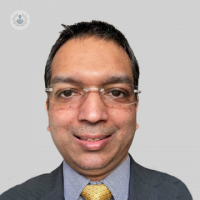When is circumcision recommended in adults?
Written by:Circumcision is surgery to partially or totally remove the male foreskin. The foreskin is tissue that covers the penis glans and its main function is to establish the correct pH and temperature to keep it sensitive, moist and smooth. Although in past decades, circumcision has been practiced for minors before the age of three, today there are a large number of adults having the operation.

When should adult circumcision be performed?
Circumcision in adults for medical reasons is practised in two situations:
- When the foreskin is too narrow and does not allow the glans to slide during erection and causes pain. In this case we call it phimosis.
- When the foreskin is too long and a poor hygienic condition is generated in the glans. This is called a redundant foreskin.
What are the benefits and drawbacks of adult circumcision?
The benefit of circumcision is clear, as a tight foreskin that cannot retract, does not allow for satisfactory sexual intercourse. In addition to relieving pain, this part is prevented from swelling during urination.
There are various problems caused if circumcision is not performed:
- Sexual intercourse is painful and the issue may cause the patient to avoid sex.
- A narrowing of the skin increases the likelihood of bacteria such as candidiasic balanitis. In rare cases, it can generate paraphimosis. This is when a retracted foreskin cannot be returned to its normal anatomic position causing great discomfort. It is extremely painful and needs to be dealt with urgently as it can lead to serious problems such as gangrene.
Does circumcision affect penis sensitivity?
In principle, it does not affect sensitivity, but during the first six months following the circumcision, there will be adjustments in sensitivity. After a few months, sexual intercourse will be normal. If you have any doubts or discomfort in this regard, it is recommended to visit an andrologist.
What advice and care should the patient follow after the operation?
At first, the thing to be aware of is the amount of extended nocturnal erections that will wake the patient because they are uncomfortable and cannot be avoided.
Following circumcision, you may experience some misdirection when urinating, so it is often advised to sit down when going to the toilet in the weeks following the operation.
It is very important to maintain correct hygiene and disinfection of the treated area: water, soap and antiseptics should be applied twice a day. From the third week it can change to once a day.
During the first three weeks, a wound dressing will also be used, mainly to protect it even more from possible microorganisms.
To find out more about adult circumcision, you can make a booking with a specialist.


